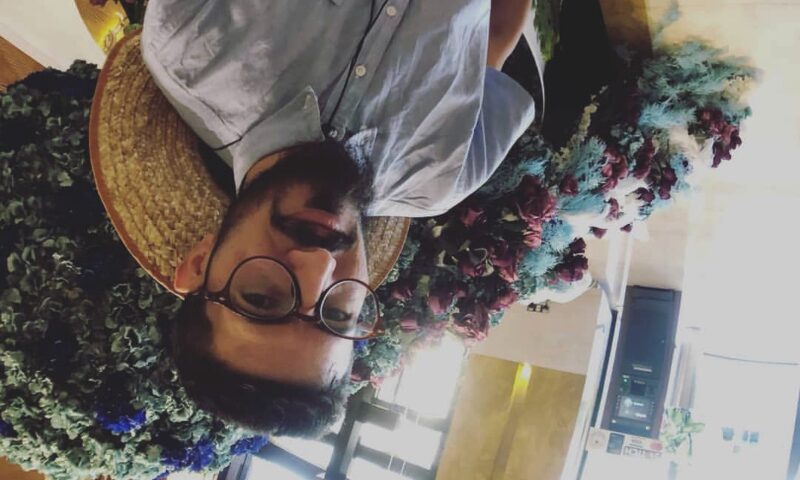Interview with Zêdan Xelef
By: Marie Michalke


Zêdan Xelef is a poet and translator based in Sulaimani, Iraqi Kurdistan. He was forced to leave his home in the Shingal Mountains in 2014 due to the so-called Islamic State’s genocide of the Êzîdî community.
He has been published by World Literature Today and the Poetry Foundation among others. Xelef is part of Kashkul project at the Center for Art and Culture at the American University of Iraq, Sulaimani. He is working on an Anthology of Kurdish poets, translations of Êzîdî folk songs transmitted in oral tradition as well as his own poetry.
Xelef was invited to participate at the PTC’s Translating Poetries symposium in September 2019. However, his visa request was denied by the UK home office despite a strong application, including letters of support from leading UK arts organisations and the head of his university. His absence was felt throughout the two days.
How do you want people to read your poetry and what do you want to convey in your poems?
I want people to read my poetry silently and to think about the words. Not because they want to know about a political event or an incident, that I might be writing about, but to make them think about those incidents. I don’t want them to be temporary news, or what I called them in one of my poems “ephemeral news”.
You have a lot of cultural references from all over the globe in your poems. Do you see yourself in the Arabic poetry tradition, or do you consider yourself part of a more global movement and you just happened to write in Arabic?
It actually just happened that my first writing was in Arabic because we didn’t enjoy the right to study and be educated in our native language. Due to the Ba’athist Arabisation campaign. Before I had access to the internet, the few books that I was able to read were in Arabic. I was lucky to get them because my father studied Arabic at the University of Mosul. Otherwise, I would not have become a reader or, consequently, started writing. You know, our culture is mostly oral. I grew up listening to epic poems or popular songs almost every night. In every single social or religious occasion, people recite poetry and play music in different forms. When I started to educate myself in my native language and I started to have access to its books, I realized that I am a better writer in my language than in Arabic. As I mentioned, I’m influenced by all that I have read and listened to and even smelled. So, it was important to know Yusuf al-Khal, Adonis, Badr Shakir al Sayyab or Abbas Beydoun all of these important Arabic poets.
Talking about language, Saddam Hussein’s Arabisation campaign dictated the official language of the Iraqi state, violently forcing languages like Kormanji and other Kurdish dialects to the margins. What effect do you think that had on your poetry?
The first words I uttered in my life was in Kormanji, I was introduced to life in Kormanji. Arabisation campaigns try to destroy my first knowledge about the world and life. Those attempts couldn't succeed at what they aimed to do which was erasing my memory as a child. The memory of a child is where the poetry springs from first.
Can there be a form of telling a history divorced from the state and institutions; in other words: can literature be divorced from hegemonic narratives? And what do you think about literature as resistance?
I think definitely good literature must be divorced from the state and from institutions. For me poetry and how I think of resistance is connected: poetry is resistance and vice versa. But poetry is never resistance in the way we might imagine it as military mass resistance. Essentially it is a question of how one understands resistance. Poetry, for example, cannot resist against death and murder, but poetry resists against lies and for life. Poetry written in support of wars, that is not poetry for me. Poetry is what has been written during war but maybe didn’t get the opportunity to be published.
For me poetry is resistance. But resistance as I said not in the military way, like someone who holds a gun and calls themselves resistance fighter. You don’t have to drive the people towards holding guns with your poems to be a poet or to resist. Actually, that is the opposite of poetry, it denies the poetry. Because poetry is only the beauty, it can never be in the sight of a bullet, no matter what the bullet is for.
What do you mean by 'beauty'?
When I say beauty, I think I mean poetry in every culture. Also songs in every culture, I think of the music of every people.
Understandably, now in Iraqi Kurdistan, the question of language is a sensitive one: some people do not want to be spoken to in Arabic at all, as they regained their right to practice a non-Arab or a non-Islamic language. How is your relationship with Arabic now?
As I said before, writing in Arabic was never a decision, also the education in Arabic was never a decision. The Arabisation programs aimed at erasing our language and thought. But I am a language enthusiast and I love all languages. I want to learn as many as I can. But of course people who faced Arabisation campaigns refuse to be spoken to in Arabic. Just as people who faced Turkifikashion campaigns, refuse to be spoken to in Turkish. But what made me shift from Arabic to Kormanji is that I can think and write in Kormanji. But when I was writing in Arabic, I was thinking in Kormanji and writing in Arabic. It was like a translation.
You mention Allan Ginsberg quite a bit, what is your fascination with him and how does his writing relate to yours?
A few years ago I first read Allan Ginsburg translated by Sargon Boulus, I loved their work. Through Ginsberg I learned about the counterculture of the 60’s in America and for me, that counterculture was an important shift in the intellectual and literary life. It rebelled against monotonous life and monotonous poetry of course. But, in general, I would say that I am influenced by every single poet I read, no matter how bad or good their poetry is, by every single piece of art that I encountered as well as every music I hear. So my eye’s memory, my ear’s and tongue’s memories, and my nose’s memory, all of these memories form what I write and influence me.
Do you think that in this day and age, in digital culture, is there some sort of tradition left?
No I think it is not possible to belong to a tradition anymore, living with this speed and exhilaration. Unless this speed and exhilaration is becoming the tradition. Like a tradition means somehow the transformation of stable ideas, but this age destabilizes everything, so destabilization becomes the new tradition.
You are part of a collective called Kashkul, this is a “research, preservation and translation collective” based at the AUIS (Amerian University Iraq Sulaymaniyah), Can you tell us a bit about this project?
I joined Kashkul five months ago, it is a research and arts collaborative at the AUIS it has several projects in the preservation of art, poetry and translation and oral history. For example, the ‘Mosul lives’ project, which researches and conducts extensive interviews which aggregate a picture of daily life in Mosul, before the Islamic State and before the American invasion in Iraq in 2003. So much change happened to one of the world’s great cities. ‘Mosul lives’ strives to preserve what was and could maybe be again.
Arrival, another project of Kashkul started by literary translators and it is a project in which we select, translate, analyse and compare critical literary contributions from every century of Kurdish poetry, we work towards a definitive anthology of Kurdish poetry in translation, we feed their poets individually.
We also started the Rojava Vigil since the Turkish invasion of Northern Syria, and we have translated poets from Rojava, Iraqi Kurdistan, Turkish Kurdistan. We have more to publish, and more is coming soon! We translate from Arabic, Kormanji Kurdish and Soranî Kurdish.
And what does translation mean to you in this context?
I think translations makes the connection of cultures possible the same way as the internet makes communication easier. Translation is important because it introduces us to the essence of cultures, and it enriches us. The cultures of small people are really rich and most of what are called minority groups in the world are still not heard and read by other people. Translation is supplying one people with another people’s beauty. It simply creates beauty. It means a lot for me to spread beauty or to promote beauty. Beauty is the essence of poetry and poetry is the essence of language and language is the essence of culture. That is why translation is important to me, especially the translation of poetry.
Oftentimes when it comes to poets from the Middle East, their work is primarily read through their identity and the social-political context of their environment. Do you feel like your work gets read through this identity-lense; and in what way is it limiting for you?
I can’t personally say how my writing is read, because I’m frankly not even sure if it is read. But, unfortunately, it is true that most literature from this part of the world is read through an identity-lense. We live the sad reality of a sectarian conflict in Iraq. Not only poets, but everyone is seen through their ethnic identities in the West and also in the region. The individuals identity becomes more important than the person themselves. consequently the individual is only seen as part of a group. The poet, just like anyone else, is seen or read through their identities, for example Sargon Boulus is still regarded only as an Assyrian-Iraqi poet, Selim Barakat, as only a Syrian-Kurdish poet; even though they are two enormously important poets in the wider Arabic realm of poetry. This is in the context of the Middle East, before the West even recognized them. I myself try to remove identities, the way someone takes off their shoes.
And how did you do that?
I don't want to be identified as Jezidi, Muslim, Arab or Kurd, cause I am a poet. So I define myself through poetry.
Especially if literature originates in places with colonial history, this Literatures is treated more as reports, or anthropological studies, not as literature and art. And the authors are seen as representatives...
That’s true of course, this is very limiting. But we can’t change the way they see us or their perspective. They see the past of the Middle East as a process of civilisation projects, as history and as a subject for archaeology; and the present only as a political area or a war zone, detached from the actual people living in it. An important note on identities from the perspective of experiencing internal displacement: it taught us that we are excluded from even the already excluded community. Places that we thought of as a home are suddenly hostile. We realized that everything is temporary, like the tent that houses us.
Zedan Xelefs poetry has been translated by World Literature Today and The Poetry Foundation.
Kurdish Anthology Arrival features:
Kajal Ahmad
Abdullah Pashew
Sherko Bekas
Kurdi
Sheihk Razza
Sheihk Razza Ta’alibani
Rojava Vigil features:
Xoşman Qado
Ciwan Qado
Ciwan Nebî
Cihan Hesen
Taha Khalil
Çîmen Adil Alî from Rojava (North East Syria)
Rênas Jiyan from Bakur (South East Turkey)
Rafiq Sabir, Farhad Pirbal from Bashur (Iraqi Kurdistan Region)
Bushra Al-Bustani from Mosul
Ihab Shghedil from Baghdad

